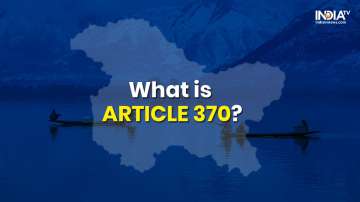Union Home Minister Amit Shah on Monday announced in the Parliament that Article 370 will be revoked. A bill will be presented in the Rajya Sabha which will revoke all conditions and special privileges given under Article 370.
The Proposal will come into effect only after the president's signature.
Article 370 of the Indian constitution gives special status to the state of Jammu and Kashmir. It has been one of the most debated Articles of the Constitution of India. When it was enacted, it was supposed to be a ‘temporary’ provision for the state of Jammu and Kashmir but 70 years down the line Article 370 is still a controversial topic in the country.
Ever since Prime Minister Modi took office in 2014, the BJP has been talking of revoking Article 370. After the landslide victory in Lok Sabha elections 2019, will BJP finally walk the talk?
What is Article 370?
ORIGINAL TEXT
Article 370. Temporary provisions with respect to the State of Jammu and Kashmir
(1) Notwithstanding anything contained in this Constitution,—
(a) the provisions of article 238 shall not apply now in relation to the state of Jammu and Kashmir;
(b) the power of Parliament to make laws for the said state shall be limited to—
(i) those matters in the Union List and the Concurrent List which, in consultation with the Government of the State, are declared by the President to correspond to matters specified in the Instrument of Accession governing the accession of the State to the Dominion of India as the matters with respect to which the Dominion Legislature may make laws for that State; and
(ii) such other matters in the said Lists as, with the concurrence of the Government of the State, the President may by order specify.
UNDERSTANDING ARTICLE 370
Article 370 means that for any other matter except Defence, Foreign Affairs and Communication, the Government of India will need the State Assembly's concurrence for applying laws.
There have been special provisions in other states of India briefly including Himachal Pradesh, Arunachal Pradesh, Andaman & Nicobar Islands etc.
In the case of Jammu and Kashmir, Article 370 embodied six special provisions
- The State of Jammu and Kashmir could have its own constitution.
- Central legislative powers over the State were limited, at the time of framing, to the three subjects of defence, foreign affairs and communications.
- Other constitutional powers of the Central Government could be extended to the State only with the concurrence of the State Government.
- The 'concurrence' was only provisional. It had to be ratified by the State's Constituent Assembly.
- The State Government's authority to give 'concurrence' lasted only until the State Constituent Assembly was convened. Once the State Constituent Assembly finalised the scheme of powers and dispersed, no further extension of powers was possible.
- The Article 370 could be abrogated or amended only upon the recommendation of the State's Constituent Assembly.
